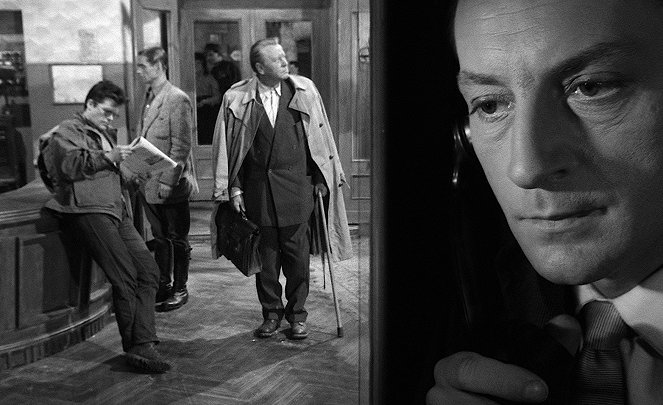Directed by:
Andrzej WajdaCinematography:
Jerzy WójcikCast:
Zbigniew Cybulski, Ewa Krzyżewska, Wacław Zastrzeżyński, Adam Pawlikowski, Bogumił Kobiela, Jan Ciecierski, Stanislaw Milski, Artur Mlodnicki (more)VOD (3)
Plots(1)
The entire film takes place on 8 May 1945, when the war in Europe ended with Germany's formal surrender – but while other countries celebrated, Poland's postwar power struggle was only just beginning. In depicting the various factions jockeying for position, including ambitious Communists, aristocratic patriots, cynical journalists and anti-Nazi rebels recently emerged from the Warsaw sewers, Wajda brilliantly anatomises a riven country desperately trying to find its identity at a time when a fifth of its population had recently been killed and many more driven into exile. Maciek Chelmicki (Zbigniew Cybulski) embodies this conflict: outwardly a calculating assassin, his ultra-cool façade begins to crack when he badly botches a mission, falls in love with the barmaid Krystyna (Ewa Krzyzewska) and dares to dream of a life outside the armed resistance that's characterised his entire adult life. (Arrow Films)
(more)Reviews (4)
When the winners lose... Ashes and Diamonds is a very slow (partly due to the length of the shots), very disillusioning, very deep dive into the atmosphere of the time when one war ended and another began. Besides knowledge of the social and political contexts (a communist appropriates everything, with the exception of his son), Jerzy Wójcik’s brilliant camerawork is what forces us to think. No showing off, minimal movement, great depth of field, well-chosen angles. The shot with Christ turned satanically upside down and the subsequent pan to the place with an open coffin in the background is worth a thousand words. In the final part of his war trilogy, Wajda plays with contrasts (fireworks and death, dark blood seeping through a white sheet), subtly referencing his own work (Maciek wears dark glasses because of his time spent wandering in the sewers) and that of others (the film’s title is taken from Norwid’s poem of the same name, the final polonaise stylised along the lines of Stanisław Wyspiański’s play Veselka, which Wajda filmed in 1973). Thanks to the artful cool of Zbigniew Cybulski, the torn romantic hero (abrupt transitions from tragic gloom to cheerfulness) who likes to play with fire (literally), neither the the slowly escalating, dreamy romantic storyline nor the brief encounter with the diamond amidst all the ashes is superfluous. Only the closing scene of suffering seems slightly forced. 80%
()
Given the high rating and overall reputation of the film, it is a cruel disappointment for me - not in terms of the film itself, but its content. It cannot be denied that Wajda demonstrates very decent craftsmanship, excellent direction of the actors, and coordination of all aspects of the film. Perhaps only the execution scene at the beginning and the protagonist's end at the very end of the film reek of theatricality, which, however, was quite common in the 50s. However, in terms of content, it is a strongly biased film that fully corresponds to Wajda's communist conviction. His interpretation of historical events is a low blow considering the fact that, unlike Czechoslovakia where the communists relied on strong domestic support, Poland was under an imposed regime, imported on the tracks of Soviet tanks. The invasion of Poland by the Soviet Union, the execution of Polish soldiers and officers (not just in Katyn!), hundreds of thousands of people dragged into labor camps in Kazakhstan and Siberia, the thorough liquidation of self-government and all elements of independent thinking, the suppression of social, economic, cultural, and religious organizations, and opposition press - none of these elements made it into Wajda's drama. Opponents of communist orders are without exception careerists, alcoholics, adventurers, and terrorists, while high-ranking communist officials have wisdom, persuasiveness, and responsibility. Wajda's film is all the more manipulative because it is professionally shot, the love story in the plot is convincing, and Zbigniew Cybulski in the lead role is excellent and charismatic... My overall impression of 35% is solely for the filmmaking craftsmanship.
()
This film is still appealing to this day through both its subject matter and its formal aspects. The story told through the eyes of a soldier of the Land Army, played by Zbigniew Cybulski, conveys through his rebelliousness to each of its new viewers the much-needed appeal to commemorate the turning points of Polish history in the days of May 1945. However, the question regarding whether the anachronistic clothing is an essential timeless element is not easy to answer half a century later. In the end, Zbigniew’s character isn’t one that I happen to like.
()
Definitely a significant work of Polish cinema, but somehow I couldn't get into it, and the character Maciek didn't help me much with that. I like how it's almost surreal in places, even though it still maintains a grounding in the real world. Maciek's ending is truly well-done and masterfully handled both in terms of direction and acting.
()

